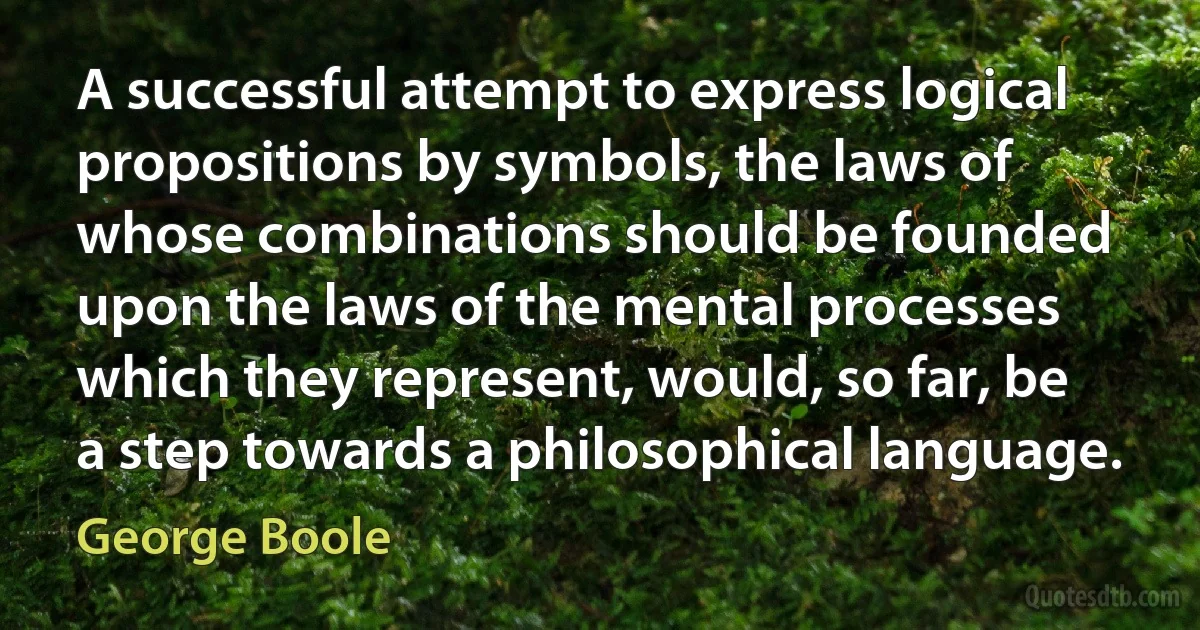George Boole quotes - page 2
THEY who are acquainted with the present state of the theory of Symbolical Algebra, are aware, that the validity of the processes of analysis does not depend upon the interpretation of the symbols which are employed, but solely upon the laws of their combination. Every system of interpretation which does not affect the truth of the relations supposed, is equally admissible, and it is thus that the same process may, under one scheme of interpretation, represent the solution of a question on the properties of numbers, under another, that of a geometrical problem, and under a third, that of a problem of dynamics or optics. This principle is indeed of fundamental importance; and it may with safety be affirmed, that the recent advances of pure analysis have been much assisted by the influence which it has exerted in directing the current of investigation.

George Boole
It is not possible, I think, to rise from the perusal of the arguments of Clark and Spinoza without a deep conviction of the futility of all endeavors to establish, entirely à priori, the existence of an Infinite Being, His attributes, and His relation to the universe. The fundamental principle of all such speculations, viz. that whatever we can clearly conceive, must exist, fails to accomplish its end, even when its truth is admitted. For how shall the finite comprehend the infinite? Yet must the possibility of such conception be granted, and in something more than the sense of a mere withdrawal of the limits of phænomal existence, before any solid ground can be established for the knowledge, à priori, of things infinite and eternal.

George Boole
I am now about to set seriously to work upon preparing for the press an account of my theory of Logic and Probabilities which in its present state I look upon as the most valuable if not the only valuable contribution that I have made or am likely to make to Science and the thing by which I would desire if at all to be remembered hereafter.

George Boole
A distinguished writer (Siméon Denis Poisson) has thus stated the fundamental definitions of the science:
:"The probability of an event is the reason we have to believe that it has taken place, or that it will take place."
:"The measure of the probability of an event is the ratio of the number of cases favourable to that event, to the total number of cases favourable or contrary, and all equally possible" (equally like to happen).
From these definitions it follows that the word probability, in its mathematical acceptation, has reference to the state of our knowledge of the circumstances under which an event may happen or fail. With the degree of information which we possess concerning the circumstances of an event, the reason we have to think that it will occur, or, to use a single term, our expectation of it, will vary.

George Boole
It appeared to me that, although Logic might be viewed with reference to the idea of quantity, it had also another and a deeper system of relations. If it was lawful to regard it from without, as connecting itself through the medium of Number with the intuitions of Space and Time, it was lawful also to regard it from within, as based upon facts of another order which have their abode in the constitution of the Mind.

George Boole
For I cannot but regard it as the same spirit which, with whatever profession of zeal, and for whatever ends of supposed piety or obedience, strives to subvertthe natural evidences of morals, - the existence of a Supreme Intelligent Cause. There is a scepticism which repudiates all belief; there is also a scepticism which seeks to escape from itself by a total abnegation of the understanding, and which, in the pride of its new-found security, would recklessly destroy every internal ground of humant trust and hope... Now to this, as to a former development of the sceptical spirit, Science stands in implied but real antagonism.

George Boole
Perhaps it is in the thought that there does exist an Intelligence and Will superior to our own,-that the evolution of the destinies of our species is not solely the product either of human waywardness or of human wisdom; perhaps, I say, it is in this thought, that the conception of humanity attains its truest dignity.

George Boole
The general laws of Nature are not, for the most part, immediate objects of perception. They are either inductive inferences from a large body of facts, the common truth in which they express, or, in their origin at least, physical hypotheses of a causal nature serving to explain phenomena with undeviating precision, and to enable us to predict new combinations of them. They are in all cases, and in the strictest sense of the term, probable conclusions, approaching, indeed, ever and ever nearer to certainty, as they receive more and more of the confirmation of experience. But of the character of probability, in the strict and proper sense of that term, they are never wholly divested. On the other hand, the knowledge of the laws of the mind does not require as its basis any extensive collection of observations. The general truth is seen in the particular instance, and it is not confirmed by the repetition of instances.

George Boole


